
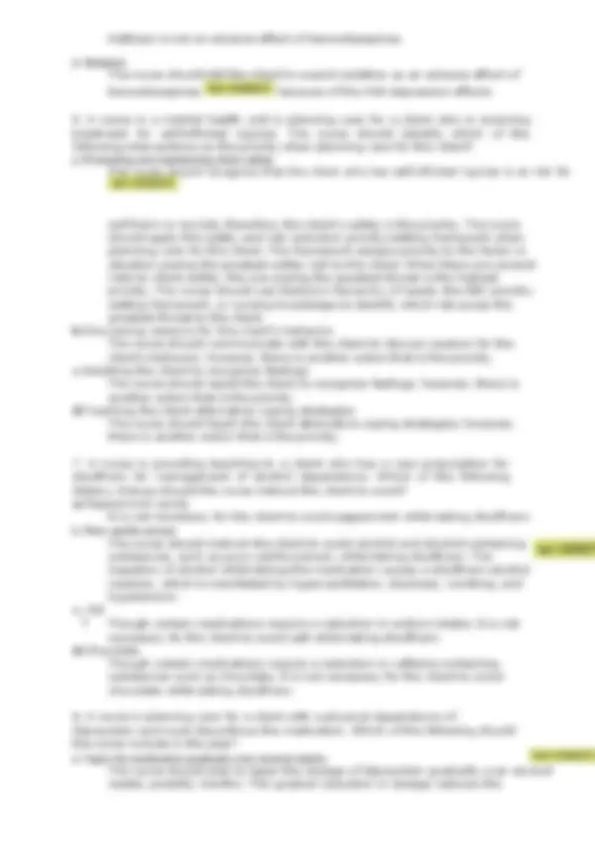
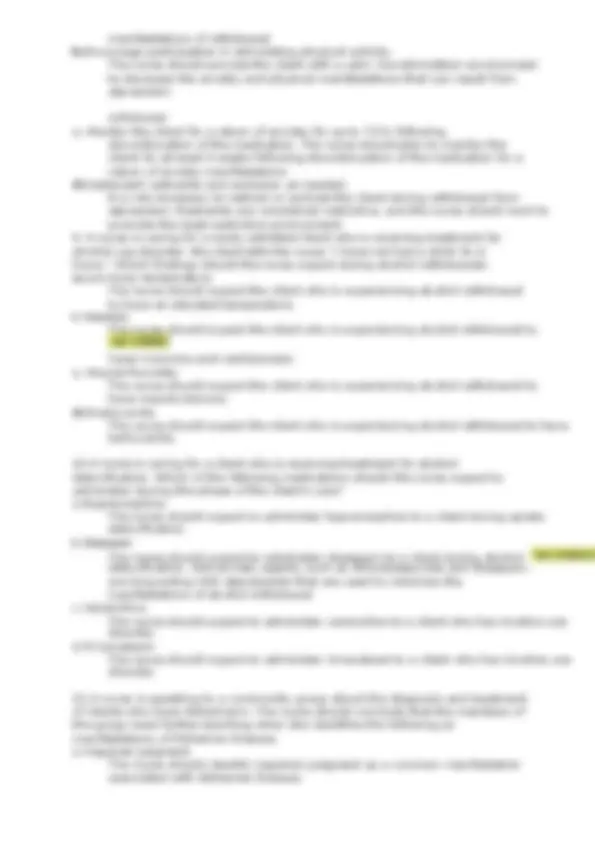
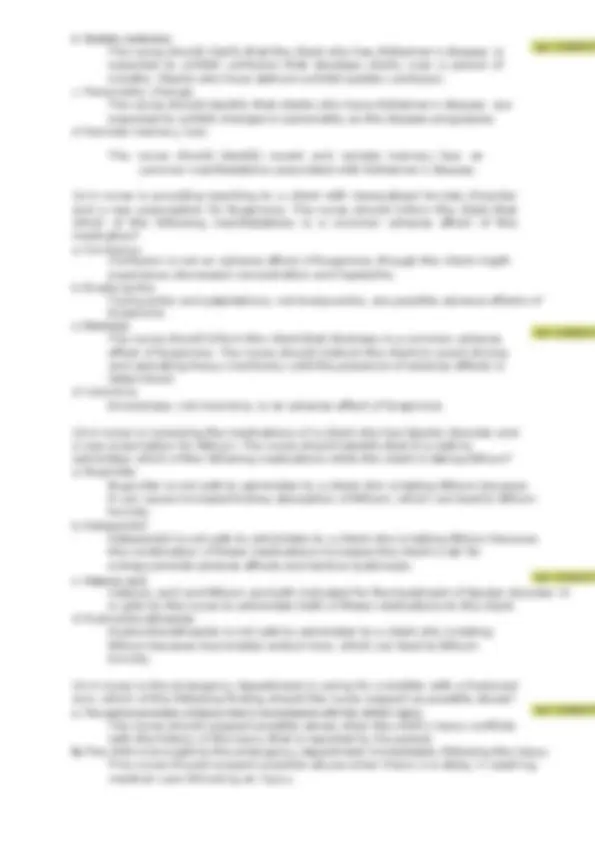
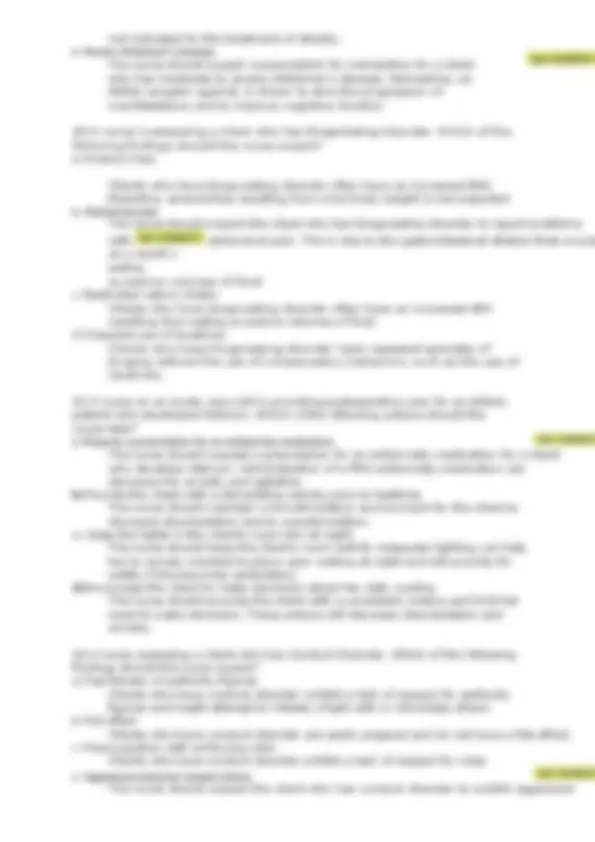
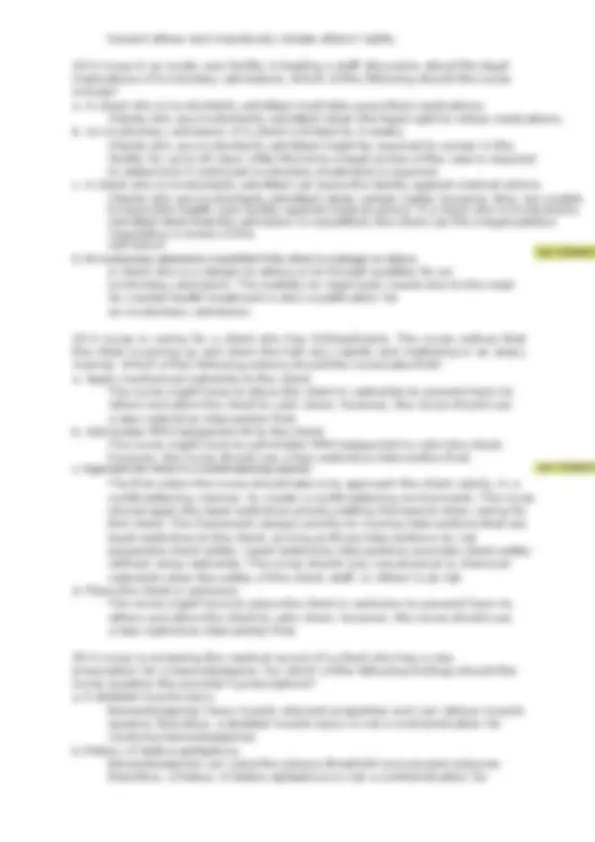
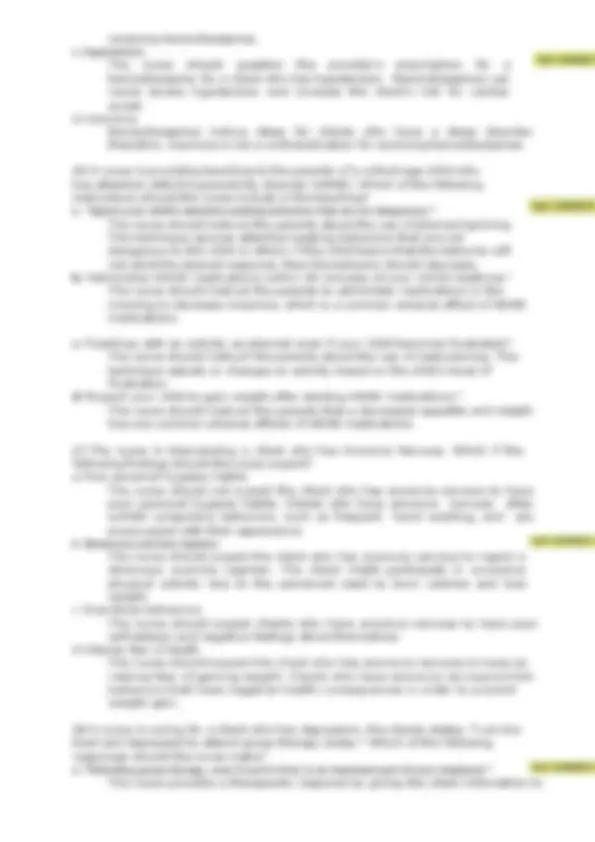
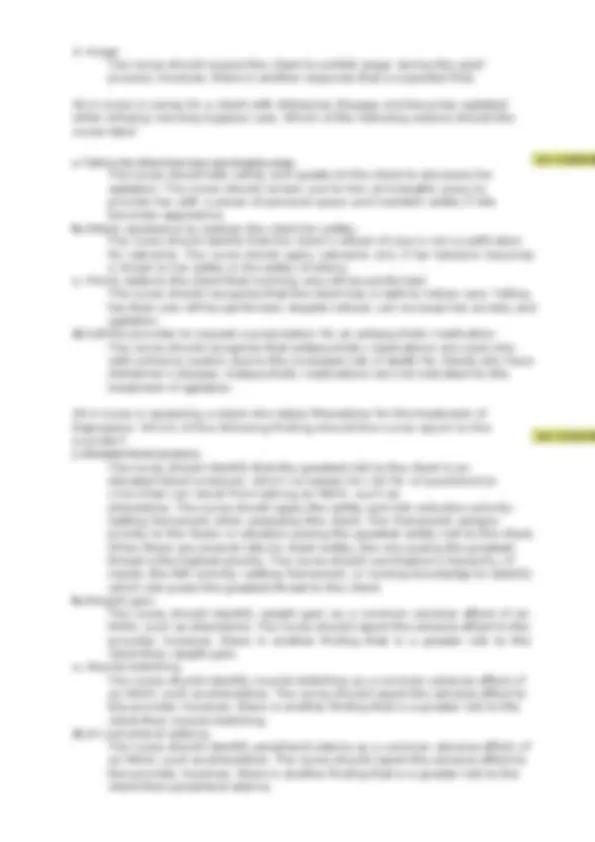
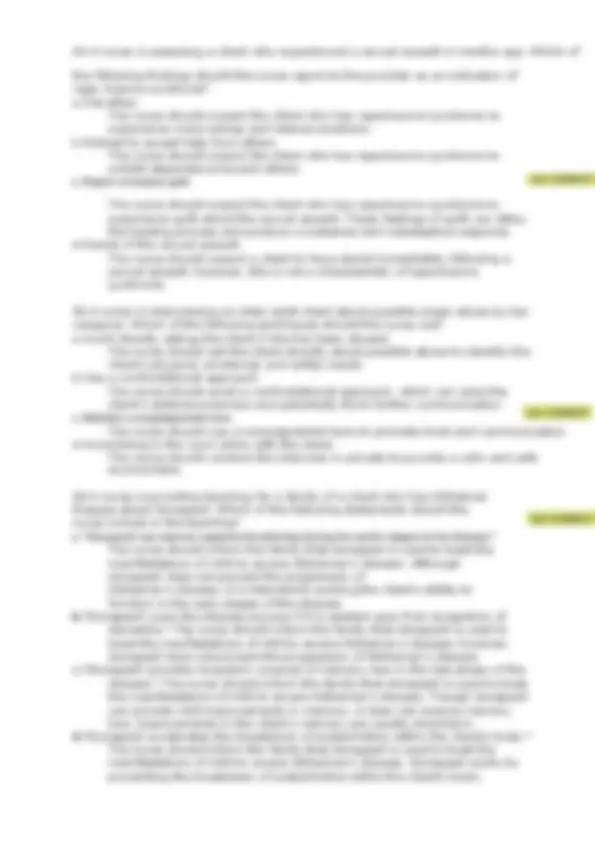
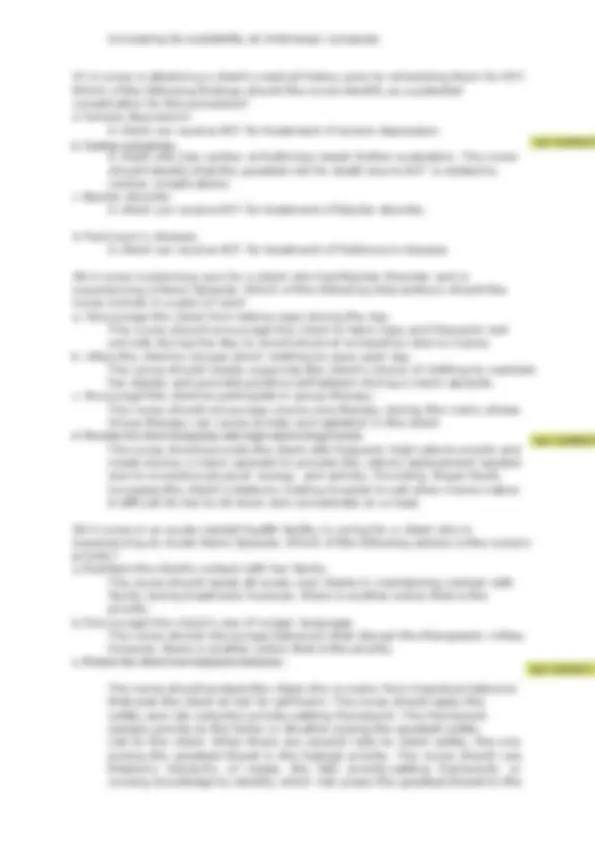
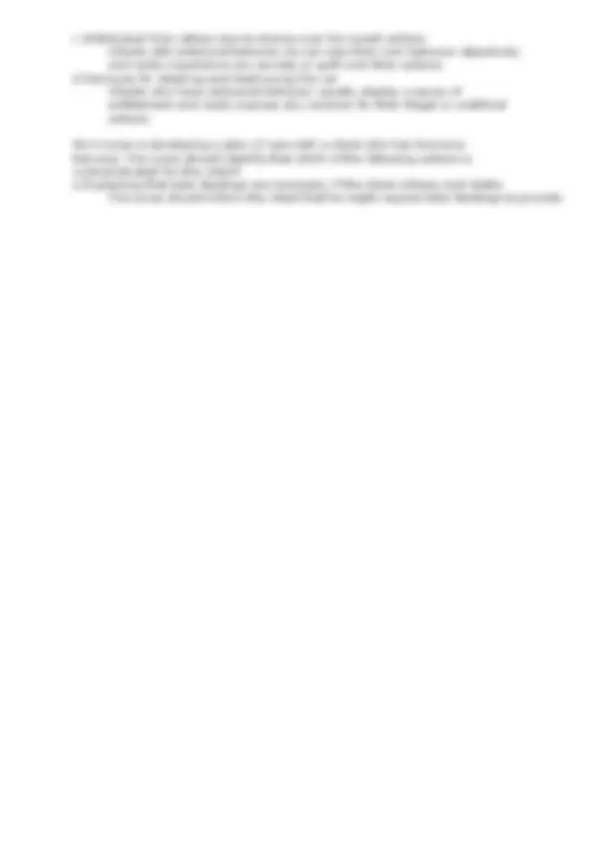
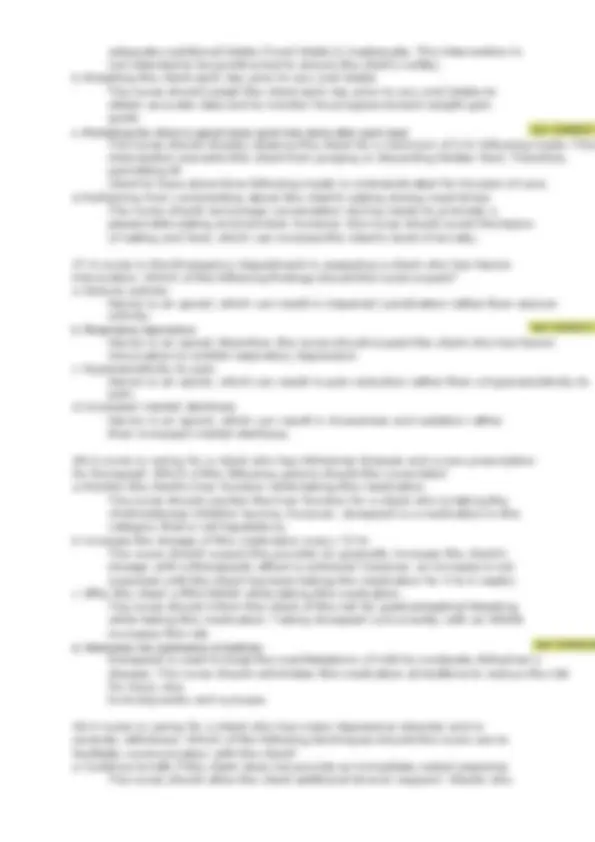
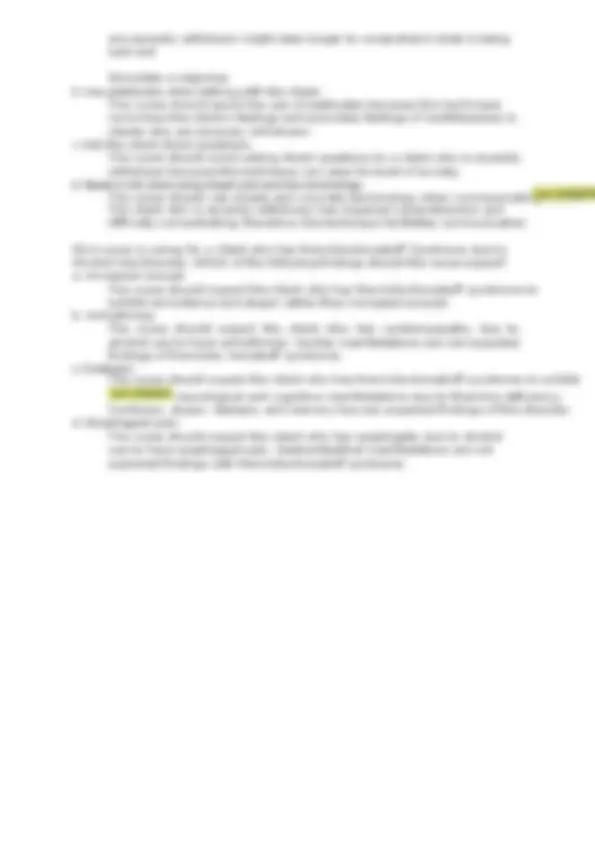


Study with the several resources on Docsity

Earn points by helping other students or get them with a premium plan


Prepare for your exams
Study with the several resources on Docsity

Earn points to download
Earn points by helping other students or get them with a premium plan
Community
Ask the community for help and clear up your study doubts
Discover the best universities in your country according to Docsity users
Free resources
Download our free guides on studying techniques, anxiety management strategies, and thesis advice from Docsity tutors
Nursing –nr326ati-Mental-Health-Final {quiz – aka – quiz-3-with –answers-en-explanation-latest update 2023/2024}
Typology: Schemes and Mind Maps
1 / 20

This page cannot be seen from the preview
Don't miss anything!













b. "Let's ignore the voices and talk about something else." The nurse should ask the client directly about what the voices are saying to determine if there is a safety risk. The nurse should also avoid validating that the voices are real, which promotes the client’s beliefs about the delusion. c. "That must be very frightening." The nurse should respond to the client’s delusion in a calm and empathetic manner. By acknowledging to the client that the delusion must be frightening, the nurse promotes the nurse- client relationship. d. "Why do you think the TV is a two-way radio?" The nurse should avoid asking the client a "why" question, which promotes a defensive client response.
manifestations of withdrawal. b. Encourage participation in stimulating physical activity. The nurse should provide the client with a calm, low-stimulation environment to decrease the anxiety and physical manifestations that can result from alprazolam withdrawal. c. Monitor the client for a return of anxiety for up to 72 hr following discontinuation of the medication. The nurse should plan to monitor the client for at least 3 weeks following discontinuation of the medication for a return of anxiety manifestations. d. Implement restraints and seclusion as needed. It is not necessary to restrain or seclude the client during withdrawal from alprazolam. Restraints are considered restrictive, and the nurse should work to promote the least restrictive environment.
b. Sudden confusion The nurse should clarify that the client who has Alzheimer’s disease is expected to exhibit confusion that develops slowly over a period of months. Clients who have delirium exhibit sudden confusion. c. Personality change The nurse should identify that clients who have Alzheimer’s disease are expected to exhibit changes in personality as the disease progresses. d. Remote memory loss The nurse should identify recent and remote memory loss as common manifestations associated with Alzheimer’s disease. 12.A nurse is providing teaching to a client with Generalized Anxiety Disorder and a new prescription for Buspirone. The nurse should inform the client that which of the following manifestations is a common adverse effect of this medication? a. Confusion Confusion is not an adverse effect of buspirone, though the client might experience decreased concentration and headache. b. Bradycardia Tachycardia and palpitations, not bradycardia, are possible adverse effects of buspirone. c. Dizziness The nurse should inform the client that dizziness is a common adverse effect of buspirone. The nurse should instruct the client to avoid driving and operating heavy machinery until the presence of adverse effects is determined. d. Insomnia Drowsiness, not insomnia, is an adverse effect of buspirone. 13.A nurse is reviewing the medications of a client who has bipolar disorder and a new prescription for lithium. The nurse should identify that it is safe to administer which of the following medications while the client is taking lithium? a. Ibuprofen Ibuprofen is not safe to administer to a client who is taking lithium because it can cause increased kidney absorption of lithium, which can lead to lithium toxicity. b. Haloperidol Haloperidol is not safe to administer to a client who is taking lithium because the combination of these medications increases the client’s risk for extrapyramidal adverse effects and tardive dyskinesia. c. Valproic acid Valproic acid and lithium are both indicated for the treatment of bipolar disorder. It is safe for the nurse to administer both of these medications to the client. d. Hydrochlorothiazide Hydrochlorothiazide is not safe to administer to a client who is taking lithium because it promotes sodium loss, which can lead to lithium toxicity. 14.A nurse in the emergency department is caring for a toddler with a fractured arm. which of the following finding should the nurse suspect as possible abuse? a. The parent provides a history that is inconsistent with the child's injury. The nurse should suspect possible abuse when the child’s injury conflicts with the history of the injury that is reported by his parent. b. The child is brought to the emergency department immediately following the injury. The nurse should suspect possible abuse when there is a delay in seeking medical care following an injury.
17.A nurse is teaching a client who has Agoraphobia about Systematic Desensitization. Which of the following comments should the nurse include in the teaching? a. "You will watch from a secure location as your therapist goes to public spaces." The nurse should recognize that encouraging the client to watch as the therapist acts as a role model in anxiety-provoking situations is an example of modeling, not systematic desensitization. b. "You will start your therapy by staying in a public space until your anxiety decreases." The nurse should recognize that sudden exposure of the client to the undesirable stimulus is an example of flooding, not systematic desensitization. c. "You will be instructed to say 'Stop!' out loud when you become anxious in public spaces." The nurse should recognize that saying "Stop!" to interrupt a negative thought is an example of thought stopping, not systematic desensitization. d. "You will slowly be exposed to increasing levels of public spaces." The nurse should inform the client that, using systematic desensitization, she will be gradually exposed to the feared situation under controlled conditions until she learns to overcome the anxious response. 18.A nurse is planning a staff education session about the administration of antidepressant medications to older adult clients. Which of the following information should the nurse include in the teaching? a. Older adult clients require a lower initial dose of antidepressant medication than adult clients. The nurse should recognize that older adult clients are recommended to start at half the adult dose for antidepressant medications. This is due to altered rates of absorption and the increased risk for adverse effects. b. Older adult clients should not receive antidepressant medication. The nurse should identify that antidepressant medications are commonly prescribed for older adult clients; however, adjustments are needed due to the clients' altered rates of absorption. c. Older adult clients achieve the therapeutic effects of antidepressant medications more quickly than adult clients. The nurse should identify that older adult clients have a decreased rate of absorption, distribution, and metabolism, resulting in a delay in achieving therapeutic effects. It can take about 1 month of treatment for the older adult client to achieve therapeutic effects. d. Older adult clients have a decreased risk for adverse effects from antidepressant medication. The nurse should identify that older adult clients have an increased risk for adverse effects due to a decreased rate of excretion. 19.A nurse in an acute mental health facility is reviewing the medication records for a group of clients. The nurse should expect a prescription for memantine for a client who has which of the following diagnoses? a. Postpartum depression The nurse should recognize that memantine, an N-methyl-D-aspartate (NMDA) receptor agonist, is not indicated for the treatment of depression. b. Schizophrenia The nurse should recognize that memantine, an NMDA receptor agonist, is not indicated for the treatment of schizophrenia. c. Obesity The nurse should recognize that memantine, an NMDA receptor agonist, is
not indicated for the treatment of obesity. d. Severe Alzheimer's disease The nurse should expect a prescription for memantine for a client who has moderate to severe Alzheimer’s disease. Memantine, an NMDA receptor agonist, is shown to slow the progression of manifestations and to improve cognitive function. 20.A nurse is assessing a client who has Binge-Eating Disorder. Which of the following findings should the nurse expect? a. Amenorrhea Clients who have binge-eating disorder often have an increased BMI; therefore, amenorrhea resulting from a low body weight is not expected. b. Abdominal pain The nurse should expect the client who has binge-eating disorder to report problems with abdominal pain. This is due to the gastrointestinal dilation that occurs as a result o eating excessive volumes of food. c. Restricted caloric intake Clients who have binge-eating disorder often have an increased BMI resulting from eating excessive volumes of food. d. Frequent use of laxatives Clients who have binge-eating disorder have repeated episodes of binging without the use of compensatory behaviors, such as the use of laxatives. 21.A nurse on an acute care unit is providing postoperative care for an elderly patient who developed Delirium. Which of the following actions should the nurse take? a. Request a prescription for an antianxiety medication. The nurse should request a prescription for an antianxiety medication for a client who develops delirium. Administration of a PRN antianxiety medication can decrease her anxiety and agitation. b. Provide the client with a stimulating activity prior to bedtime. The nurse should maintain a low-stimulation environment for the client to decrease disorientation due to overstimulation. c. Keep the lights in the client's room dim at night. The nurse should keep the client’s room well-lit. Adequate lighting can help her to remain oriented to place upon waking at night and will provide for safety if she becomes ambulatory. d. Encourage the client to make decisions about her daily routine. The nurse should provide the client with a consistent routine and limit her need to make decisions. These actions will decrease disorientation and anxiety. 22.A nurse assessing a client who has Conduct Disorder. Which of the following findings should the nurse expect? a. Fearfulness of authority figures Clients who have conduct disorder exhibit a lack of respect for authority figures and might attempt to initiate a fight with or intimidate others. b. Flat affect Clients who have conduct disorder are easily angered and do not have a flat affect. c. Preoccupation with enforcing rules Clients who have conduct disorder exhibit a lack of respect for rules. d. Aggressive behavior toward others The nurse should expect the client who has conduct disorder to exhibit aggression
receiving benzodiazepines. c. Hypotension The nurse should question the provider’s prescription for a benzodiazepine for a client who has hypotension. Benzodiazepines can cause severe hypotension and increase the client’s risk for cardiac arrest. d. Insomnia Benzodiazepines induce sleep for clients who have a sleep disorder; therefore, insomnia is not a contraindication for receiving benzodiazepines. 26.A nurse is providing teaching to the parents of a school-age child who has attention deficit hyperactivity disorder (ADHD). Which of the following instructions should the nurse include in the teaching? a. "Ignore your child's attention-seeking behaviors that are not dangerous." The nurse should instruct the parents about the use of planned ignoring. This technique ignores attention-seeking behaviors that are not dangerous to the child or others. If the child learns that the behavior will not elicit the desired response, then the behavior should decrease. b. "Administer ADHD medications within 30 minutes of your child's bedtime." The nurse should instruct the parents to administer medications in the morning to decrease insomnia, which is a common adverse effect of ADHD medications. c. "Continue with an activity as planned even if your child becomes frustrated." The nurse should instruct the parents about the use of restructuring. This technique adjusts or changes an activity based on the child’s level of frustration. d. "Expect your child to gain weight after starting ADHD medications." The nurse should instruct the parents that a decreased appetite and weight loss are common adverse effects of ADHD medications. 27.The nurse is interviewing a client who has Anorexia Nervosa. Which if the following findings should the nurse expect? a. Poor personal hygiene habits The nurse should not expect the client who has anorexia nervosa to have poor personal hygiene habits. Clients who have anorexia nervosa often exhibit compulsive behaviors, such as frequent hand washing, and are preoccupied with their appearance. b. Strenuous exercise regimen The nurse should expect the client who has anorexia nervosa to report a strenuous exercise regimen. The client might participate in excessive physical activity due to the perceived need to burn calories and lose weight. c. Grandiose behaviors The nurse should expect clients who have anorexia nervosa to have poor self-esteem and negative feelings about themselves. d. Intense fear of death The nurse should expect the client who has anorexia nervosa to have an intense fear of gaining weight. Clients who have anorexia nervosa exhibit behaviors that have negative health consequences in order to prevent weight gain. 28.A nurse is caring for a client who has depression, the clients states, "I am too tired and depressed to attend group therapy today." Which of the following responses should the nurse make? a. "Attending group therapy, even if you're tired, is an important part of your treatment." The nurse provides a therapeutic response by giving the client information to
make an informed decision. Group therapy is beneficial to the client who has depression by promoting peer support and reducing social isolation. b. "That's okay if you're too tired to attend group therapy today, but you will have to go tomorrow." The nurse should recognize that a lack of energy is expected for a client who has depression. There is no indication that the client will have more energy for group therapy in the future. The nurse should also respect the client’s autonomy and avoid giving a directive about required participation. c. "It is normal to feel tired when you're feeling depressed. The others in group therapy also feel this way." The nurse should avoid minimizing the client’s feelings by making a generalization about her status in relation to others. d. "I agree with your decision to wait for participation in group therapy until you begin to feel better." The nurse should avoid giving approval to the client’s decision, which promotes the need for her to please the nurse. The nurse should also encourage her to participate in group therapy to promote improvement of her depression. 29.A nurse is performing an admission assessment for a client who has restricting type Anorexia Nervosa. The nurse should expect which of the following findings? a. Decreased caloric intake The nurse should expect the client who has restricting type anorexia nervosa to have a restricted and decreased caloric intake due to the client’s intense fear of weight gain. b. Recurrent binging Recurrent binging is an expected finding of binge-eating/purging type anorexia nervosa. Clients who have restricting type anorexia nervosa are not expected to exhibit bulimic manifestations, such as binge eating. c. Compensatory vomiting Compensatory vomiting is an expected finding of binge-eating/purging type anorexia nervosa. Clients who have restricting type anorexia nervosa are not expected to exhibit bulimic manifestations, such as compensatory vomiting. d. Loss of appetite Loss of appetite is not an expected finding of a client who has anorexia nervosa. Clients who have restrictive type anorexia nervosa maintain an appetite; however, they have inadequate intake due to fear of gaining weight. 30.A nurse in a substance abuse treatment facility is reviewing the medication records for a group of clients. The nurse should expect to administer Methadone for a client who has a substance use disorder for which of the following addictions? a. Amphetamines The nurse should recognize that the administration of methadone is not indicated for the treatment of amphetamine use disorder. b. Opiates The nurse should recognize that the administration of methadone is indicated for the treatment of opiate use disorder. Opiates include opium, morphine, codeine, methadone, and heroin. Methadone is given as a substitute to prevent cravings and severe manifestations of opiate withdrawal. c. Barbiturates The nurse should recognize that the administration of methadone is not indicated for the treatment of barbiturate use disorder. d. Hallucinogenics The nurse should recognize that the administration of methadone is not
d. Anger The nurse should expect the client to exhibit anger during the grief process; however, there is another response that is expected first. 32.A nurse is caring for a client with Alzheimer Disease and becomes agitated while refusing morning hygiene care. Which of the following actions should the nurse take? a. Talk to the client from two arm-lengths away. The nurse should talk calmly and quietly to the client to decrease her agitation. The nurse should remain one to two arm-lengths away to provide her with a sense of personal space and maintain safety if she becomes aggressive. b. Obtain assistance to restrain the client for safety. The nurse should identify that the client’s refusal of care is not a justification for restraints. The nurse should apply restraints only if her behavior becomes a threat to her safety or the safety of others. c. Firmly state to the client that morning care will be performed. The nurse should recognize that the client has a right to refuse care. Telling her that care will be performed, despite refusal, can increase her anxiety and agitation. d. Call the provider to request a prescription for an antipsychotic medication. The nurse should recognize that antipsychotic medications are used only with extreme caution due to the increased risk of death for clients who have Alzheimer’s disease. Antipsychotic medications are not indicated for the treatment of agitation. 33.A nurse is assessing a client who takes Phenelzine for the treatment of Depression. Which of the following finding should the nurse report to the provider? a. Elevated blood pressure The nurse should identify that the greatest risk to the client is an elevated blood pressure, which increases his risk for a hypertensive crisis that can result from taking an MAOI, such as phenelzine. The nurse should apply the safety and risk reduction priority- setting framework when assessing this client. This framework assigns priority to the factor or situation posing the greatest safety risk to the client. When there are several risks to client safety, the one posing the greatest threat is the highest priority. The nurse should use Maslow’s hierarchy of needs, the ABC priority- setting framework, or nursing knowledge to identify which risk poses the greatest threat to the client. b. Weight gain The nurse should identify weight gain as a common adverse effect of an MAOI, such as phenelzine. The nurse should report the adverse effect to the provider; however, there is another finding that is a greater risk to the client than weight gain. c. Muscle twitching The nurse should identify muscle twitching as a common adverse effect of an MAOI, such as phenelzine. The nurse should report the adverse effect to the provider; however, there is another finding that is a greater risk to the client than muscle twitching. d. 2+ peripheral edema The nurse should identify peripheral edema as a common adverse effect of an MAOI, such as phenelzine. The nurse should report the adverse effect to the provider; however, there is another finding that is a greater risk to the client than peripheral edema.
34.A nurse is assessing a client who experienced a sexual assault 6 months ago. Which of the following findings should the nurse report to the provider as an indication of rape- trauma syndrome? a. Flat affect The nurse should expect the client who has rape-trauma syndrome to experience mood swings and intense emotions. b. Refusal to accept help from others The nurse should expect the client who has rape-trauma syndrome to exhibit dependence toward others. c. Report of intense guilt The nurse should expect the client who has rape-trauma syndrome to experience guilt about the sexual assault. These feelings of guilt can delay the healing process and produce a sustained and maladaptive response. d. Denial of the sexual assault The nurse should expect a client to have denial immediately following a sexual assault; however, this is not a characteristic of rape-trauma syndrome. 35.A nurse in interviewing an older adult client about possible anger abuse by her caregiver. Which of the following techniques should the nurse use? a. Avoid directly asking the client if she has been abused. The nurse should ask the client directly about possible abuse to identify the client’s physical, emotional, and safety needs. b. Use a confrontational approach. The nurse should avoid a confrontational approach, which can raise the client’s defensive barriers and potentially block further communication. c. Maintain a nonjudgmental tone. The nurse should use a nonjudgmental tone to promote trust and communication. d. Avoid being in the room alone with the client. The nurse should conduct the interview in private to provide a calm and safe environment. 36.A nurse is providing teaching for a family of a client who has Alzheimer Disease about Donepezil. Which of the following statements should the nurse include in the teaching? a. "Donepezil can improve cognitive functioning during the earlier stages of the disease." The nurse should inform the family that donepezil is used to treat the manifestations of mild to severe Alzheimer’s disease. Although donepezil does not prevent the progression of Alzheimer’s disease, it is intended to prolong the client's ability to function in the early stages of the disease. b. "Donepezil cures the disease process if it is started upon first recognition of dementia." The nurse should inform the family that donepezil is used to treat the manifestations of mild to severe Alzheimer’s disease; however, donepezil does not prevent the progression of Alzheimer’s disease. c. "Donepezil provides long-term reversal of memory loss in the last phase of the disease." The nurse should inform the family that donepezil is used to treat the manifestations of mild to severe Alzheimer’s disease. Though donepezil can provide mild improvements in memory, it does not reverse memory loss. Improvements in the client’s memory are usually short-term. d. "Donepezil accelerates the breakdown of acetylcholine within the client's brain." The nurse should inform the family that donepezil is used to treat the manifestations of mild to severe Alzheimer’s disease. Donepezil works by preventing the breakdown of acetylcholine within the client’s brain,
client. d. Redirect excessive energy to creative tasks. The nurse should redirect the client’s energy into a calming and constructive activity; however, there is another action that is the priority. 40.A nurse in an acute mental health facility is planning care for a client who has obsessive-compulsive disorder (OCD). Which of the following actions should the nurse include in the plan? a. Encourage the client to focus on personal hygiene. Clients who have OCD are often obsessive about personal hygiene and might perform ritualistic behaviors related to handwashing and grooming. The nurse should plan interventions to limit and control these obsessive thoughts. b. Limit the hours the client sleeps each day. Clients who have OCD often have difficulty sleeping due to obsessive thoughts and ritualistic behaviors. The nurse should plan interventions to promote sleep. c. Instruct the client to practice thought stopping. The nurse should teach the client who has OCD to use thought stopping. By saying "stop" out loud, the client can learn to interrupt obsessive thoughts. d. Make negative statements about the client's behavior. Clients who have OCD often feel shame and humiliation about their obsessive thoughts and ritualistic behavior. The nurse should plan interventions to decrease feelings of shame and increase feelings of self- worth. 41.A nurse is caring for a client who has alcohol use disorder.Following alcohol withdrawal, which of the following medications should the nurse expect to administer to the client during maintenance? a. Methadone The nurse should expect to administer methadone to the client who has opioid withdrawal. b. Disulfiram The nurse should expect to administer disulfiram as a deterrent to prevent future use of alcohol. The nurse must ensure that the client has not had any alcohol intake for at least 12 hr prior to administration. c. Chlordiazepoxide The nurse should expect to administer chlordiazepoxide during alcohol withdrawal. Chloridiazepoxide is not a medication used to help with maintenance. d. Naloxone The nurse should expect to administer naloxone to the client who is experiencing a narcotic overdose. 42.A nurse is caring for a client who attends family counseling with his partner and their children. The client tells the nurse he isn't going to attend any further sessions and states, "I don't have time for all this talking." Which of the following responses should the nurse make? a. "It must be difficult for you to talk about family problems." The nurse’s response indicates empathy for the client’s feelings and is an example of the therapeutic communication technique of verbalizing what the client implied. With this technique, the nurse helps him focus on the actual reason for not wanting to continue family therapy. b. "You should continue attending the family counseling sessions until the
therapist tells you to stop." The nurse’s response is an example of the nurse giving advice, which is nontherapeutic and a possible block to further communication. c. "If you continue to go to family counseling, I'm sure you'll be able to resolve your family problems soon." The nurse’s response is an example of false reassurance. The client’s continued participation is not an indication that problems will be resolved. d. "I think you need to continue family therapy if your partner and children want to receive further counseling." The nurse’s response is an example of the nurse giving advice, which is nontherapeutic and a possible block to further communication. 43.A nurse in an acute substance is assessing a client who received treatment in the Emergency Department for a Heroin Overdose. Which of the following findings should the nurse anticipate during Heroin Withdrawal? a. Excessive sleeping The nurse should expect the client to have insomnia during heroin withdrawal. b. Muscle aches The nurse should expect the client to have muscle aches during heroin withdrawal. The nurse should expect this and other manifestations of withdrawal to begin within 6 to 8 hr following the last dose of heroin. c. Pupillary constriction The nurse should expect the client to have pupillary dilation during heroin withdrawal. d. Absent bowel sounds The nurse should expect the client to have diarrhea during heroin withdrawal. 44.A nurse in an emergency room is assessing a client who has cocaine intoxication. Which of the following findings should the nurse expect? a. Low blood pressure The nurse should expect a client who has cocaine intoxication to have an elevated blood pressure. b. Dilated pupils Dilated pupils are associated with the use of cocaine. c. Conjunctival redness The nurse should expect a client who has cannabis intoxication to have conjunctival redness. d. Decreased body temperature The nurse should expect a client who has cocaine intoxication to have an elevated body temperature. 45.A nurse is admitting a client who has antisocial personality disorder to an acute care unit. The client is admitted under court order following the theft and destruction of a car. Which of the following behaviors should the nurse expect the client to display? a. Relief about finally receiving care for a problem for which he was previously afraid to ask for help A client who has antisocial personality disorder exhibits a pattern of irresponsible behavior that lacks morals and ethics and brings the client into conflict with society. The client views this behavior as justified and does not perceive the need for help. b. Anger with the nursing staff for hospitalizing him against his will. A client who has antisocial personality disorder exhibits a low frustration level and can quickly become angry and aggressive when the situation goes against his will or desires.
adequate nutritional intake if oral intake is inadequate. This intervention is not intended to be punitive but to ensure the client’s safety. b. Weighing the client each day prior to any oral intake The nurse should weigh the client each day prior to any oral intake to obtain accurate data and to monitor his progress toward weight gain goals. c. Permitting the client to spend some quiet time alone after each meal The nurse should directly observe the client for a minimum of 1 hr following meals. This intervention prevents the client from purging or discarding hidden food. Therefore, permitting th client to have alone time following meals is contraindicated for his plan of care. d. Refraining from commenting about the client's eating during meal times The nurse should encourage conversation during meals to promote a pleasurable eating environment; however, the nurse should avoid the topics of eating and food, which can increase the client’s level of anxiety. 47.A nurse in the Emergency Department is assessing a client who has Heroin Intoxication. Which of the following findings should the nurse expect? a. Seizure activity Heroin is an opioid, which can result in impaired coordination rather than seizure activity. b. Respiratory depression Heroin is an opioid; therefore, the nurse should expect the client who has heroin intoxication to exhibit respiratory depression. c. Hypersensitivity to pain Heroin is an opioid, which can result in pain reduction rather than a hypersensitivity to pain. d. Increased mental alertness Heroin is an opioid, which can result in drowsiness and sedation rather than increased mental alertness. 48.A nurse is caring for a client who has Alzheimer Disease and a new prescription for Donepezil. Which of the following actions should the nurse take? a. Monitor the client's liver function while taking this medication. The nurse should monitor the liver function for a client who is taking the cholinesterase inhibitor tacrine; however, donepezil is a medication in this category that is not hepatotoxic. b. Increase the dosage of this medication every 72 hr. The nurse should expect the provider to gradually increase the client’s dosage until a therapeutic effect is achieved; however, an increase is not expected until the client has been taking the medication for 4 to 6 weeks. c. Offer the client a PRN NSAID while taking this medication. The nurse should inform the client of the risk for gastrointestinal bleeding while taking this medication. Taking donepezil concurrently with an NSAID increases this risk. d. Administer the medication at bedtime. Donepezil is used to treat the manifestations of mild to moderate Alzheimer’s disease. The nurse should administer this medication at bedtime to reduce the risk for injury due to bradycardia and syncope. 49.A nurse is caring for a client who has major depressive disorder and is severely withdrawn. Which of the following techniques should the nurse use to facilitate communication with the client? a. Continue to talk if the client does not provide an immediate verbal response. The nurse should allow the client additional time to respond. Clients who
is client. are severely withdrawn might take longer to comprehend what is being said and formulate a response. b. Use platitudes when talking with the client. The nurse should avoid the use of platitudes because this technique minimizes the client’s feelings and promotes feelings of worthlessness in clients who are severely withdrawn. c. Ask the client direct questions. The nurse should avoid asking direct questions to a client who is severely withdrawn because this technique can raise his level of anxiety. d. Speak to the client using simple and concrete terminology. The nurse should use simple and concrete terminology when communicating with th The client who is severely withdrawn has impaired comprehension and difficulty concentrating; therefore, this technique facilitates communication. 50.A nurse is caring for a client who has Wernicke-Korsakoff Syndrome due to Alcohol Use Disorder. Which of the following findings should the nurse expect? a. Increased arousal The nurse should expect the client who has Wernicke-Korsakoff syndrome to exhibit somnolence and stupor rather than increased arousal. b. Arrhythmias The nurse should expect the client who has cardiomyopathy due to alcohol use to have arrhythmias. Cardiac manifestations are not expected findings of Wernicke- Korsakoff syndrome. c. Confusion The nurse should expect the client who has Wernicke-Korsakoff syndrome to exhibit neurological and cognitive manifestations due to thiamine deficiency. Confusion, stupor, diplopia, and memory loss are expected findings of this disorder. d. Esophageal pain The nurse should expect the client who has esophagitis due to alcohol use to have esophageal pain. Gastrointestinal manifestations are not expected findings with Wernicke-Korsakoff syndrome.